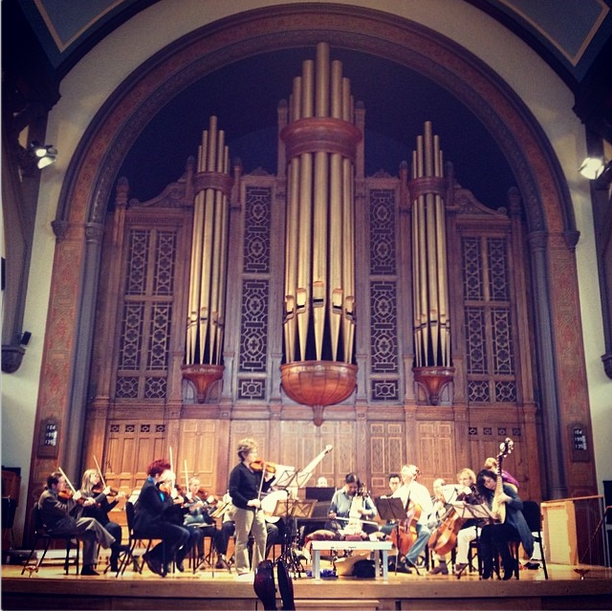
Over a decade ago, Tafelmusik’s double bass player Alison Mackay had the notion of taking Antonio Vivaldi’s Four Seasons concertos and inviting Chinese, Indian and Inuit performers to perform with Toronto’s premiere period string orchestra. Now living at the heart of Tafelmusik’s repertoire is a showcase of Vivaldi’s seasons through a multi-cultural filter of musical traditions.
I must admit I often carry misgivings about the use of non-European musical customs blended in with canonized western forms as tokens of “otherness.” But there are times when it can work well, especially when done with authentic musicians as equal collaborators. Tafelmusik’s The Four Seasons: A Cycle of the Sun is just that, and provides an exciting year in the life of the musical world, which includes everyone from everywhere.
March 6th marked the remounting of the pan-cultural interpretation, which first appeared in 2002 to explore the artistic celebration of the four seasons around the world. The concert reunited Wen Zhao (Chinese pipa), Aruna Narayan Kalle (Indian sarangi), and Aqsarniit (Inuit throat singers), who each brought cultural context to the four concerto movements that travel through the seasons, and in this case, across the world.
The structure of the program is built around the four concerto movements, and included intermittent sections of spoken dialogue, solo performances, and an improvised Ciaconna performed by the orchestra, Wen Zhao, and Aruna Narayan Kalle.
Starting with Wen Zhao, her virtuosity was in full bloom with her performance of White Snow in Spring. Her ever-flowing and perfectly even tremolos seem analogous to Jeanne Lamon’s sustained bow strokes.
Sarangi performer Aruna Narayan Kalle, is the first female musician to play the ancient and difficult instrument, which can be traced to 5th and 6th century sculptures. The South Asian bowed instrument is hauntingly reminiscent of the human voice, which was intimately demonstrated in her performance of Monsoon Raag.
One of the highlights of the evening were Inuit vocalists Sylvia Cloutier and Beatrice Deer, from the first nations vocal group known as Aqsarniit (Northern Lights). They performed short examples of traditional Inuit throat singing or katajjaq, which is a type of rhythmic vocal game sung in duets as a kind of contest to see who can outlast the other.
At one point, the duo somehow managed to get the entire concert hall to sing along with them in rhythm, which was no easy feat. Cloutier, on more than one occasion said she could feel the love in the room, and she was right; the audience was head-over-heels for the charismatic pair.
The grand finale was “Winter” by Mychael Danna, the Golden Globe and Oscar-winning Canadian composer who recently scored Life of Pi. The piece was a bit of a re-mixed loose interpretation of Vivaldi’s final winter movement, and included the orchestra, Katajjaq vocalists, Pipa, and Sarangi. One could appreciate Danna’s trademark style of combining divergent sound worlds on display here. The piece stood well on its own.
Though this event could have easily come across as gimmicky, the guest performers, Mychael Danna, and Tafelmusik, performed their multi-cultural four seasons with flair, and it is little wonder people keep coming back in droves to Tafelmusik each season.
The show runs throughout the week, closing on March 12th. For tickets, dates, and times, see here.
Michael Vincent
- THE SCOOP | Royal Conservatory’s Dr. Peter Simon Awarded The Order Of Ontario - January 2, 2024
- THE SCOOP | Order of Canada Appointees Announced, Including Big Names From The Arts - December 29, 2023
- Ludwig Van Is Being Acquired By ZoomerMedia - June 12, 2023



